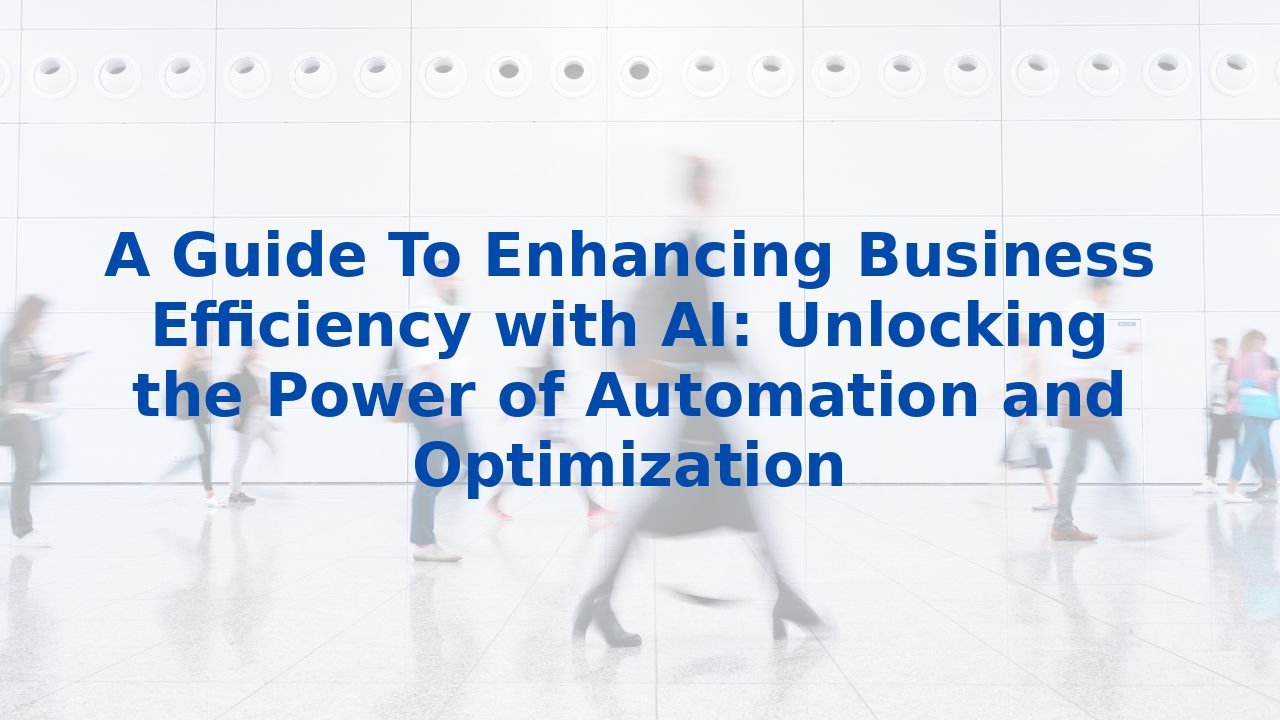A Guide To Enhancing Business Efficiency with AI: Unlocking the Power of Automation and Optimization
A Guide To Enhancing Business Efficiency with AI: Unlocking the Power of Automation and Optimization
Introduction
In an era where the pace of change is exponential, businesses are on a relentless quest to streamline their operations and boost efficiency. Enter Artificial Intelligence (AI)—a transformative force that promises to redefine how organizations operate. With its vast capabilities, AI can automate routine tasks, optimize workflows, and enhance decision-making processes. This article explores how AI can revolutionize business efficiency and why investing in employee training can manifest the full potential of these AI systems.
Streamlining Workflows with AI
Imagine a workplace where mundane tasks no longer consume valuable time. AI is the catalyst that makes this a reality. By embracing automation, businesses can:
- Automate Repetitive Tasks: Say goodbye to hours spent on data entry or manual customer responses. AI-driven automation tools can take over these tasks, enabling employees to concentrate on strategic endeavors that drive innovation.
- Utilize Intelligent Automation: With AI capable of executing routine tasks without error, organizations can witness a surge in productivity as their workforce focuses on higher-value activities.
- Leverage Generative AI for Innovation: AI isn’t just about doing things faster; it’s about doing things differently. Generative AI introduces endless possibilities by creating novel designs or solutions, revolutionizing product development and service delivery.
Process Mining and Optimization
Understanding the intricate dynamics of business processes is vital for optimization. AI excels in this realm through:
- Process Mining: Using sophisticated algorithms, AI analyzes event logs to glean insights into how tasks are actually performed. This clarity allows organizations to identify bottlenecks and inefficiencies, laying the foundation for improvement.
- Process Optimization: Armed with data from process mining, AI can propose optimization strategies. This may include suggestions to automate repetitive tasks and eliminate wasteful practices, leading to streamlined operations.
Enhancing Decision-Making with AI
Data-driven decisions lead to success. AI enhances this process by providing predictive recommendations based on trends across datasets. Imagine the ability to predict how fluctuating prices impact profitability—AI empowers analysts to simulate various scenarios, enabling data-backed pricing strategies that maximize revenue while maintaining customer satisfaction.
Improving Customer Experience
AI's role in enhancing customer journey cannot be overstated. Through sophisticated data analysis, AI can pinpoint customer patterns and preferences, allowing businesses to:
- Personalize Marketing Strategies: Craft targeted campaigns that resonate with individual customer desires, fostering deeper connections.
- Enhance Customer Service: Automate and enrich the customer support experience, ensuring prompt responses to inquiries while anticipating needs.
This seamless integration of AI along the customer journey ensures that every interaction is optimized, creating a strong loyalty foundation.
Real-Time Monitoring and Predictive Analytics
AI brings real-time capabilities to the table, transforming how businesses monitor their operations:
- Real-Time Monitoring: With AI-driven insights, companies can assess the current status of workflows, allowing for proactive intervention to address issues or capitalize on opportunities.
- Predictive Analytics: Use AI to build risk models and anticipate future challenges—be it an economic downturn or supply chain disruptions—empowering organizations to respond efficiently.
The Role of AI in Manufacturing and HR
AI extends its transformative touch across various sectors, notably in manufacturing and HR:
- Manufacturing Efficiency: The adoption of robots and collaborative robots (cobots) has revolutionized production lines, minimizing errors, reducing costs, and significantly expediting processes.
- Streamlined Recruitment: In human resources, AI automates initial candidate assessments, slashing interview times and enhancing hiring efficiency.
Training Employees for AI Success
While AI systems have immense capabilities, the human element remains irreplaceable. Training employees to engage effectively with AI tools is imperative. Organizations should focus on:
- Fostering AI Literacy: Equip teams with the ability to interpret data-driven insights and seamlessly integrate AI technologies into their workflows.
- Strengthening Problem-Solving Skills: Enable employees to focus on complex decision-making and strategic planning, tasks that AI cannot fully address.
By investing in training initiatives, companies not only boost workforce productivity but also create a culture of adaptability essential for thriving in a digital landscape.
Conclusion
As AI continues to redefine the contours of business efficiency, organizations must embrace it as a strategic partner. The benefits of streamlining workflows, enhancing decision-making, and optimizing customer experiences through AI are undeniable. Moreover, nurturing employee capabilities through training ensures that they can thrive alongside AI, driving long-term success. Organizations ready to unlock the transformative potential of AI are poised to gain a significant competitive edge in today’s rapidly evolving marketplace.



